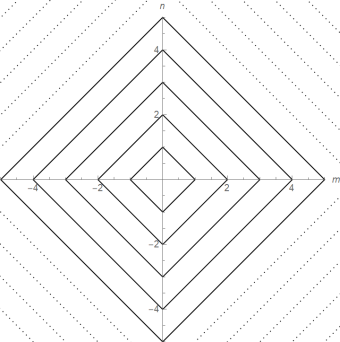I would like to evaluate the following sum (numerically will suffice): $$ \sum_{m,n=-\infty,(m,n)\neq(0,0)}^{\infty}\frac{1}{m^{4}+n^{4}} $$ I first tried to do $$ \sum_{m,n=1}^{\infty}\frac{1}{m^{4}+n^{4}} $$
NSum[1/(m^4 + n^4), {m, 1, Infinity}, {n, 1, Infinity}]
but got the error "Summand (or its derivative) -((4.\m^3)/(m^4+n^4)^2) is not numerical
at point n = 1.`."
I don't understand this as it's a well-behaved, convergent sum. What is going on here?
In terms of the original sum I want to calculate, I'm not sure how to elegantly eliminate the $(m,n)=(0,0)$ term. I thought of using a Kronecker Delta like
NSum[(1 - KroneckerDelta[m, 0] KroneckerDelta[n, 0])/(m^4 +
n^4), {m, -Infinity, Infinity}, {n, -Infinity, Infinity}]
but it still complains about the infinite term. How can I avoid this?
Thanks in advance for any help.


Piecewise[{{0, m == n == 0}}, 1/(m^4 + n^4)]$\endgroup$